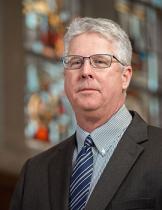Affiliate spotlight: William Evans on holistic approaches to reducing poverty in the United States
William Evans is a professor of economics and chair of the Economics Department at the University of Notre Dame. He is a co-founder of the Wilson Sheehan Lab for Economic Opportunities (LEO). William has been a J-PAL affiliate since 2017.
What is one current research project that you're particularly excited about?
LEO is evaluating a program in Rapid City, South Dakota called Uplifting Parents (UP) that provides a stipend and case management services to single mothers interested in obtaining a college degree. The program is run by Catholic Social Services (CSS) and supported by 28 other coalition members.
UP was started about four years ago, but the lead agency recently received funds to expand the program enough to conduct an RCT. What excites me most about this project is that CSS is a modest-sized agency in a small town. Their success in launching an RCT serves as an example for other agencies of their size that want to integrate an RCT into their program.
What is your "dream evaluation"? (It doesn't have to be feasible!)
LEO is conducting an evaluation of a program run by Catholic Charities Fort Worth called the Padua Pilot, which offers intensive case management and some financial support to low-income families to help move them out of poverty.
The early results are pretty encouraging. Poverty has many causes, so a one-size-fits-all program will not move the needle on this topic. In contrast, case management helps individualize, holistic treatment and hence has promise. I would love to see this evaluation done in twenty more cities.
What is your most memorable story from visiting project sites?
Any opportunity we get to spend time with the clients of programs that we evaluate and the people that help them is uplifting. Economists are used to just looking at rows and columns in data sets. Putting a human face on the research is important and humbling.
Do you have any advice for early career researchers?
Field research can be pretty risky. Projects can go sideways for any number of reasons. One of our current LEO projects, for example, was recently stalled because of fires in Northern California.
My advice is to diversify your research portfolio to mitigate these risks by either having multiple projects active at any one time, which is difficult and expensive, or to have some non-field projects in your portfolio as well.
What are you reading currently (related or unrelated to economics)?
I have a couple of ongoing projects about the opioid and heroin epidemics and I’ve been reading a lot of popular press about how these crises came about. Dreamland by Sam Quinones is exceptionally well done.
Where do you see opportunities for interdisciplinary work to advance research related to your areas of interest?
I co-founded LEO at the University of Notre Dame in 2012. Through impact evaluations, we aim to identify the innovative, effective, and scalable programs that help people move out of poverty in the United States.
Most of the programs we are examining within an RCT framework are multi-treatment interventions like the Padua Pilot mentioned above, so it is hard to know what portion of the program is really driving results.
At LEO we like working with qualitative researchers who interview clients and program administrators to get some sense about what aspects of the program are really helping clients. Qualitative work helps us narrow down the next iteration of the evaluation.
What’s next for LEO?
We recently received a gift from a generous donor to hire two tenured/tenure-track economists whose work include field study that supports LEO’s mission—to find evidence-based solutions to poverty. We should have an ad for these positions posted in the American Economic Association’s Job Openings for Economists listings soon!
